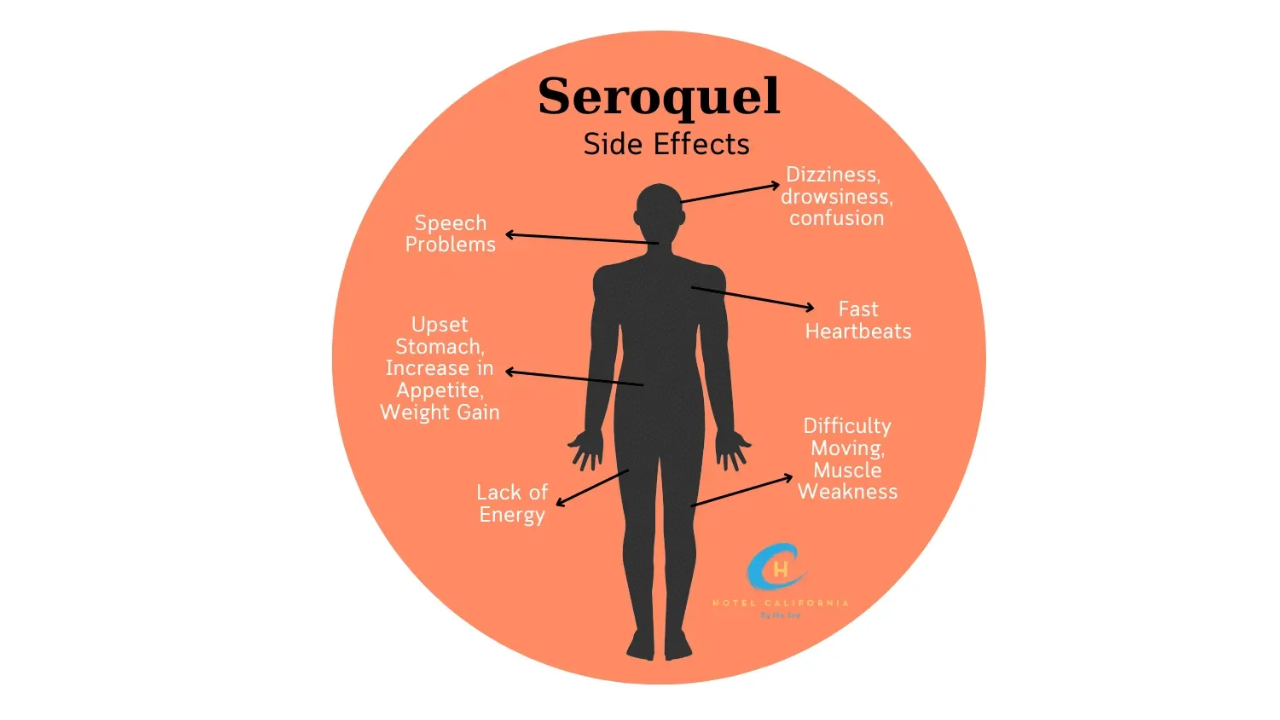
Finding the right medicine for anxiety isn’t always easy. What works well for one person may not be the best choice for another. It often takes time to figure out the best fit. That is why weighing the risks and benefits of any medicine is so important, such as Seroquel for anxiety disorder.
Seroquel can be an effective treatment for anxiety, but that does not mean it is the right option for you. All prescription medications come with potential side effects, and some may cause unwanted reactions or even make certain symptoms worse while improving others.
If you are struggling to find the right drug for anxiety or are considering your options before starting treatment, it’s worth learning about Seroquel. Let’s check out this article to know if this antipsychotic medication is your best option or not.
Overview of Seroquel for Anxiety Disorder

Seroquel, also known by its generic name quetiapine, is an FDA-approved medication used to treat various mental health conditions. It belongs to a group of medicines called antipsychotics. Both quetiapine and its extended-release form (quetiapine XR) work by blocking specific neurological receptors.
These receptors help regulate serotonin and dopamine, two neurotransmitters that influence mood. By targeting these channels, quetiapine prevents the brain from overreacting to the neurotransmitters. By changing how these brain channels work, this medicine helps decrease symptoms of specific mental health issues.
It can also stabilize mood, making it useful for treating bipolar disorder, insomnia, major depression, schizophrenia, panic disorder, and other mental health disorders. These are the mental health disorders and psychiatric disorders the FDA has officially approved it for, but research suggests it may help with other issues as well.
Clinical trials have shown that this antipsychotic drug may also be effective for generalized anxiety disorder when used off-label.
When Should You Use Seroquel for Anxiety Disorder?
Seroquel should only be used for anxiety treatment if other anxiety medicines, such as Celexa (citalopram), Prozac (fluoxetine), and Zoloft (sertraline) have not worked. Taking Seroquel or any other anxiety medicine as prescribed is important for treating your symptoms effectively.
Taking Seroquel or any other anxiety medicine properly and regularly is important for treating your symptoms effectively. If your physician prescribes it for anxiety, continue using this medication for as long as recommended. Even if your symptoms improve, do not stop taking the medicine without consulting your doctor.
Seroquel is not addictive, but suddenly stopping it can cause withdrawal signs. Your doctor may advise gradually reducing the dose of your medicine to prevent this. Also, be aware that taking Seroquel with anticonvulsant medications may reduce their effectiveness in treating your anxiety symptoms.
What Is the Seroquel Dosage for Anxiety?
Seroquel is sometimes prescribed off-label to treat anxiety disorders. Since this is not an FDA-approved use, the manufacturer does not provide standard dosing guidelines for anxiety. If your physician prescribes Seroquel for anxiety, it’s important to take the exact dose they recommend.
Before deciding on a dosage, your doctor will likely review your medical history, assess the severity of your symptoms and condition, and check how well you tolerate Seroquel. You can take Seroquel with or without food, but it’s best to be consistent to help maintain steady medication levels in your bloodstream.
Taking it at the same time each day also helps form a routine and improves its effectiveness. Seroquel is available in both immediate-release and extended-release forms, with different strength options. The extended-release version is more often used for treating anxiety because it releases the medicine gradually into the body throughout the day.
How Does Seroquel Affect Anxiety?
The effects of Seroquel on anxiety can differ from person to person. Unlike some anti-anxiety medications, it does not provide any noticeable immediate relief. Instead, with regular use, many people notice a gradual decrease in their anxiety signs over time. Seroquel works by changing certain neurotransmitters in the brain.
Its effect on anxiety is usually more subtle compared to fast-acting medicines like benzodiazepines. People may not feel the effects of Seroquel the way they would with a sedative. Instead, its effectiveness becomes noticeable over time as anxiety symptoms gradually improve with regular use.
Seroquel for Anxiety Disorder: Side Effects

Seroquel might help with anxiety, but it can cause various side effects, which may vary in occurrence and severity from person to person. Like other antipsychotics, these side effects happen because the medication affects the chemicals in the brain. Common side effects are:
- Weight gain
- Drowsiness
- Dizziness
- Higher blood sugar levels
- Constipation
- Higher cholesterol levels
- Dry mouth
- Headache
- Higher appetite
- Fatigue
If you take Seroquel for anxiety disorder, some serious side effects may need immediate medical care. These include:
- Uncontrolled body movements (Tardive Dyskinesia)
- High fever
- Intense dizziness
- Difficulty swallowing
- Fainting
- Irregular pulse
- Continuous vomiting or nausea
- Vision problems
- Excessively high blood sugar levels (hyperglycemia)
- Neuroleptic malignant syndrome (NMS) (confusion, muscle stiffness, high fever, and changes in blood pressure and heart rate)
Like any medication, Seroquel can cause side effects ranging from mild to serious. This isn’t a full list of all potential side effects. If you have any questions, talk to your doctor to understand the risks and advantages of this medicine.
When taking Seroquel off-label for anxiety, some side effects may be more noticeable, including fatigue, drowsiness, and dizziness. These side effects can affect daily activities. Another common side effect is weight gain, which some people might experience.
It’s also crucial to watch for serious side effects such as neuroleptic malignant syndrome (NMS), which needs immediate medical care. Although rare, NMS can occur. Therefore, people taking Seroquel should stay alert for symptoms like muscle stiffness, high fever, or changes in mental state.
Signs That Seroquel Is Helping with Anxiety
To know if Seroquel is working for anxiety, pay attention to how your symptoms change over time. Look for signs of improvement, such as feeling less anxious, worrying less often, and having fewer panic attacks. A more stable mood and better sleep can also be good indicators.
Additionally, if you find it easier to handle daily tasks and stress, it may mean the medication is making a positive difference. Tracking these changes can help you and your doctor determine if Seroquel is the right fit for you.
Warnings of Taking Seroquel for Anxiety Disorder

If you experience any signs of confusion, tremors, high fever, uncontrolled muscle movements, or weakness while taking Seroquel, contact your doctor immediately. You need to always follow the manufacturer’s instructions or your doctor’s prescription when using Seroquel for any health condition, including anxiety.
Taking too much or using this medicine for a long time may lead to irreversible movement disorders. One such disorder, known as tardive dyskinesia, causes involuntary movements like lip pursing, grimacing, and rapid eye blinking.
Although more common with older antipsychotic drugs, tardive dyskinesia can also occur with some newer medications, like Seroquel. Furthermore, the FDA cautions that using antipsychotic medications such as Seroquel can increase the danger of death in older adults with dementia-related health conditions.
Seroquel may also raise the risk of suicidal thoughts and behaviors. If you or someone you know experiences behavior or mood changes while taking this medication, consult a doctor right away.
Bottom Line: Should I Use Seroquel for Anxiety Disorder?
If your anxiety feels unmanageable, even with therapy and medicine, switching to Seroquel may be an option. Research suggests it may provide relief for some people. However, if you’re dealing with any anxiety disorder, it’s important to talk to your doctor first about your symptoms.
They can help you decide if a medication change is necessary or if adjusting your current dosage might be a better approach. Medication works best when taken correctly, but it’s not the only solution. Your doctor might also recommend lifestyle changes, such as improving your diet, exercising more, or trying therapy, such as cognitive behavioral therapy (CBT).
The right treatment is the one that helps you feel better, and working with a healthcare professional is the best way to find what works for you. I hope that after reading this article, you now know whether you want to use Seroquel for Anxiety Disorder or not.
